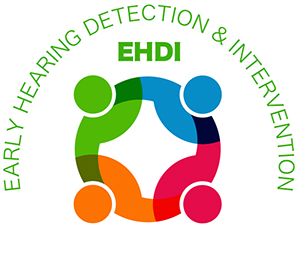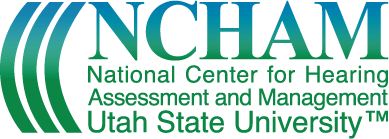EHDI/ UNHS Resources
- Virtual Site Visit
- Just In Time Family Resource Guide
- Congenital Cytomegalovirus (cCMV)
- COVID-19 Resources
- Quality Improvement
- Promoting EHDI Practices (PEP)
- Newborn Hearing Screening Training Curriculum
- EHDI Consultants
- Interagency Collaboration, Data Sharing, and Privacy Issues
- Educational & Training Videos
- NCHAM Materials
- EHDI Learning Center
- Telehealth
- EHDI Web Resource Guide
- Deaf and Hard of Hearing Adult Involvement With Families of Deaf and Hard of Hearing Children
- Events & Webinars
- NCHAM Meetings and Conferences
- Links
National Center for Hearing Assessment and Management
Utah State University, 2615 Old Main Hill, Logan, Utah 84322
Tel: 435.797.3584 || Questions and Comments
© NCHAM, 1999–
Many of the resources on this site are offered in various formats, such as PDF, Word, Excel, and PowerPoint. If the files don’t open on your device, you can download free viewers for these formats from Adobe (PDF) and Microsoft (Word, Excel, PowerPoint).
Please contact us for assistance if there is website material that is not accessible to you.
As a research center at Utah State University, NCHAM is supported by funds from the Utah State Legislature as well as various private, state, and federal entities. From 2001 - 2024 NCHAM served as the National Technical Resource Center for all state-based Early Hearing Detection and Intervention (EHDI) programs in the United States. NCHAM is committed to promoting respectful dialogue about how to improve services for children who are deaf or hard of hearing. Materials, presentations, and other activities disseminated by NCHAM represent many different views and opinions by stakeholders interested in improving services and outcomes for children who are deaf or hard of hearing. Developers, authors, and presenters of those materials and activities are responsible for the views and content of their material and no endorsement by NCHAM, USU, or any of our funders is implied or expressed.



Comments
It's great Information. Thank you
Posted by: Azucena Santana, 04/01/20
I appreciate the intent of the video to change the language that may create a damaging, negative picture of child’s life at the very beginning of the parent’s journey. I also appreciate that deaf people feel that there is nothing “wrong” with children that are born deaf. However, It is unfair to expect hearing parents to easily embrace this new trajectory for our child’s life simply by changing the words that are used and the people in the room when the news is delivered. I, too, think that inclusive, positive words are much more sensible than harsh, clinical ones. However, the video makes some big assumptions without any data on what hearing parents are actually feeling when they learn their child is deaf.
If you want to understand what hearing parents are feeling, then you have to ask them, and not assume you know the answer. Since the video does not seem to be based on any data about what parents experience, the assumptions about the problem and the solution cannot be validated. Additionally, given the significant gaps between screening rates and diagnostic rates for children identified through newborn screening, it would be malpractice not to create some level of urgency among hearing parents.
Deaf parents can continue to do what they would normally do to give their children language when their child is identified at birth. For hearing parents, a complete shift of perspective, culture, and actions outside of their experience has to begin immediately for their child to be successful. Whether the family chooses to sign or chooses to get hearing aids, this is not something that comes natural to them and it requires a behavior change and some sense of urgency—i.e. you must learn to sign now or you must get a full diagnostic test and pursue hearing technology now. My fear is that making the words softer will only add to the tendency toward denial or complacency, and that will not result in positive outcomes for the child.
If I had never met a deaf person before, I doubt that meeting an adult deaf person at the time of a “refer” screening result for my infant would ease my fears and discomfort. In my case, it would have made me even more confused because I was not ready to accept this new pathway for my child yet. In my head, two minutes ago, my child was ready to accomplish all of my language goals for her just like all of the other children in my family as far back as I can remember. And now, in a split second, that is all different. This transition will not happen in the hospital room when the baby is two days old whether someone says “diagnose” or “identify” nor if a deaf adult is present or a clinician. It is overwhelming because it is unexpected.
I suggest that more hearing parents of deaf children be asked to describe their experience and why they felt overwhelmed. When a video based on that data is released, then I feel we will be closer to truly making the experience less stressful for parents.
Posted by: Carianne Muse, 02/17/12
I shared this with a parent group in Ohio and here is a response from a parent:
I am a hearing parent of two deaf children. When we found out that our oldest son was deaf, everything was presented in as good a way as professionals could do it - there was no large group who gave the news to us. However, I don't feel that even with an ideal presentation there is any way to avoid a hearing parent feeling sad. A hearing parent would naturally expect a hearing child, and therefore there is a loss that needs to be grieved - a loss of expectation and a loss of their child's hearing. That being said - we were not "worried" about our children growing up deaf.
This is a good video - however I think that there is no way to avoid parents feeling overwhelmed and sad when they find out their child is deaf. There are many situations where I'm sure parents did not have the support we did and I'm sure could be improved.
I think the comment about "identified" verses "diagnosed" is a very good point - however, working within the framework of IEP's and getting services needed, the "diagnoses" is what is asked for. Many of the other terms suggested are very good. For both of our children we chose cochlear implants AND ASL, which is not a common choice but it has been wonderful for us. Deaf role models are wonderful and because of our pursuit of ASL we have been fortunate enough to have many in our life.
Regarding the point about counseling: we did not receive counseling and I wish we had. Although it does suggest that this is something serious - it IS a serious change in your life journey and it never hurts to talk through those feelings.
Posted by: Jennifer Creach, 02/02/12
I love this video because it does really explain what we as parents are feeling. I'm not really sure it's anyone's fault though because when a deaf child is born to hearing parents, people don't know what the right thing to say is. So they use words they are familiar with. I do like how this video presents alternatives for professionals to use, and empowers parents, such as myself, to ask for more information.
Posted by: Virginia Calvelage, 02/02/12
Allow me to begin my response by sharing a little about myself. I am a retired academic who grew up as the only hard of hearing child in all of my K-12 classrooms in the public schools in a wealthy Connecticut town. I also attended a prestigious small college for my bachelor's degree and have a doctorate from the University of Maryland. My first language is English, I have a great speaking voice, and I began learning American Sign Language as a young adult at Gallaudet University, where I spent my long, productive, and rewarding career.
When I first saw Rachel Benedict's video, I was elated. Here was a leader from among the emerging generation of Deaf academics - individuals with excellent reading skills, excellent critical thinking skills, and excellent sense of the needs of young deaf children. Hurray!!! When I am gone, there will be others to pick up the torches and carry on.
Rachel's message, to me, is two-fold. First and foremost, individuals like her have a unique and invaluable insight into the needs of deaf or hard of hearing children.
Yes they do. They have just as much to offer as a physician or an audiologist. A hearing individual can never really understand what it is like to spend day in and day out as a person with a hearing loss. Until you have one, maybe when you are 80. And then you will really know. And then you will be sorry that you and your loved ones do not know sign language.
The second message, and I am trying to be brief (after all, many people will want to have their say about this) - is as the first commenter put it, "I think it would be great if all of us could be prompted by the video to think carefully about the words and tone we use so that from day one, each family feels hopeful and holds the expectation that their child will have a happy and successful future." Rachel Benedict's video should give you a broader lens on what those children can become. She is a star. She is a star because her parents knew what she needed. They knew from experience. And their own parents' experience as well -- all four of Rachel's grandparents transcended, if you will, all those barriers that Deaf people had way before EHDI ever existed. Their experience brings something else to the EHDI table. Something that most physicians and audiologists and other well-meaning, loving, smart, hearing people just do not have.
To have a Deaf professional at the first EHDI meeting would not be an intrusion if the doctor and/or the EHDI person validated it. If EHDI professionals really truly valued the experience, wisdom and caring that Deaf professionals can bring to every family's EHDI table, those children, all of them, would have an exponentially greater chance of a truly happy healthy lives that are as rich as the ones you yourselves presumably lead. They need access, and early, to the community of Deaf people. And EHDI as a whole, and as individuals, ought to embrace that.
Posted by: Gina Oliva, 01/30/12
I appreciate that the intent of the video is to encourage everyone to examine how information is communicated to families. I wish it had opened in a more positive tone, because framing the situation as one in which doctors and early intervention providers are at "fault" and "outnumber" and overwhelm parents with negative perspectives, fails to acknowledge how many good people in those fields want to do and say the right thing. For example, saying "communication options" doesn't necessarily convey that there is only one option that can/must be chosen. Many products or services come with options (plural) that allow people to choose one or several of the offerings. "Communication opportunities," may not be a better term if it fails to convey to parents that there is a need to make an initial choice in a timely way. Maybe what we are trying to describe is a "communication and technology menu" where parents may select one or more items on the menu simultaneously, or sequence them as they are needed in the changing life of the child.
I disagree with the video's suggestion that always having a Deaf adult present to deliver news to parents is the "missing link" in helping them to accept information about their child's hearing. It could feel intrusive/invasive to a parent if someone they have never met shows up at a very sensitive time claiming to be a "role model" or "mentor" to their baby or young child. What I do agree with is that whoever delivers the information should be very clear with parents that the child's future is not in jeopardy based on hearing level, and that even though this news may be unexpected, it is just one aspect of the larger successful and satisfying journey they are on with their child. Parents need to know that whatever support they need will be available for them, which can include what professionals, other parents, and adults who are Deaf/Hard of Hearing can offer. They should be given options about who they want to receive support from at different points along the path.
The video also assumes that using the word "deaf" with parents of a newly identified child will be a positive introduction. For many hearing parents, though, that could sound frightening, even if it is said in a very positive tone, because they don't have positive associations from previous experience to draw on. Also, the children who are being identified have varying degrees of hearing. I agree that emphasizing a child's "hearing level" or "hearing status" is a respectful way to talk about an individual child. What it doesn't quite solve linguistically is what words to use when talking about a group of children whose hearing status is different from their hearing peers. Over the years, many words have been tried, but it seems we've had a hard time finding one term that comes across as positive and respectful to everyone.
In general, though, even if nobody has yet found the perfect terminology, it would be great if all of us think carefully about what is communicated to families and how, so that each family feels hopeful and holds the expectation that their child will have a happy and successful future. If everyone involved in EHDI believes that, then we'll find ways to communicate that message.
Posted by: Lenore Shisler, 01/30/12